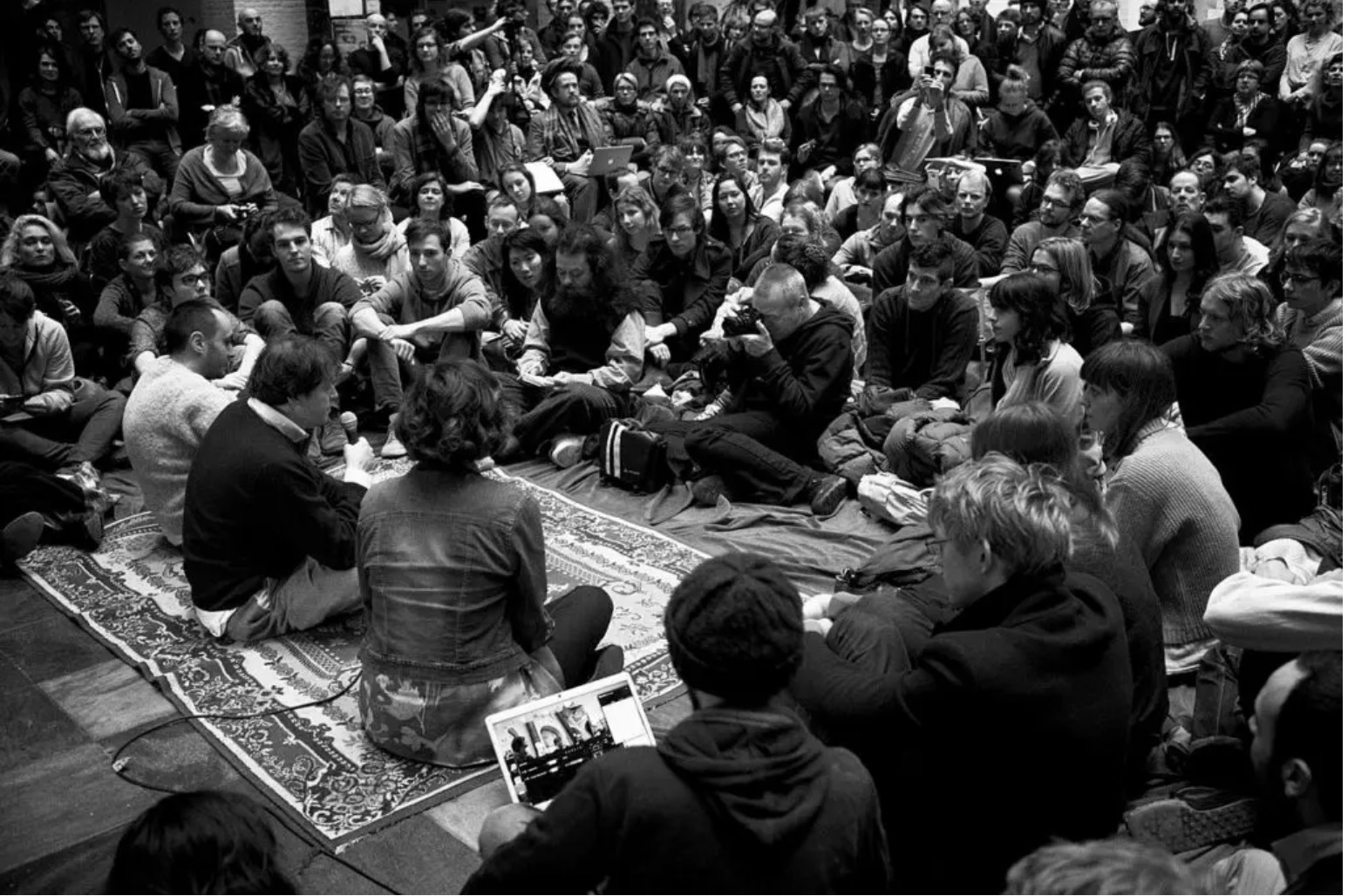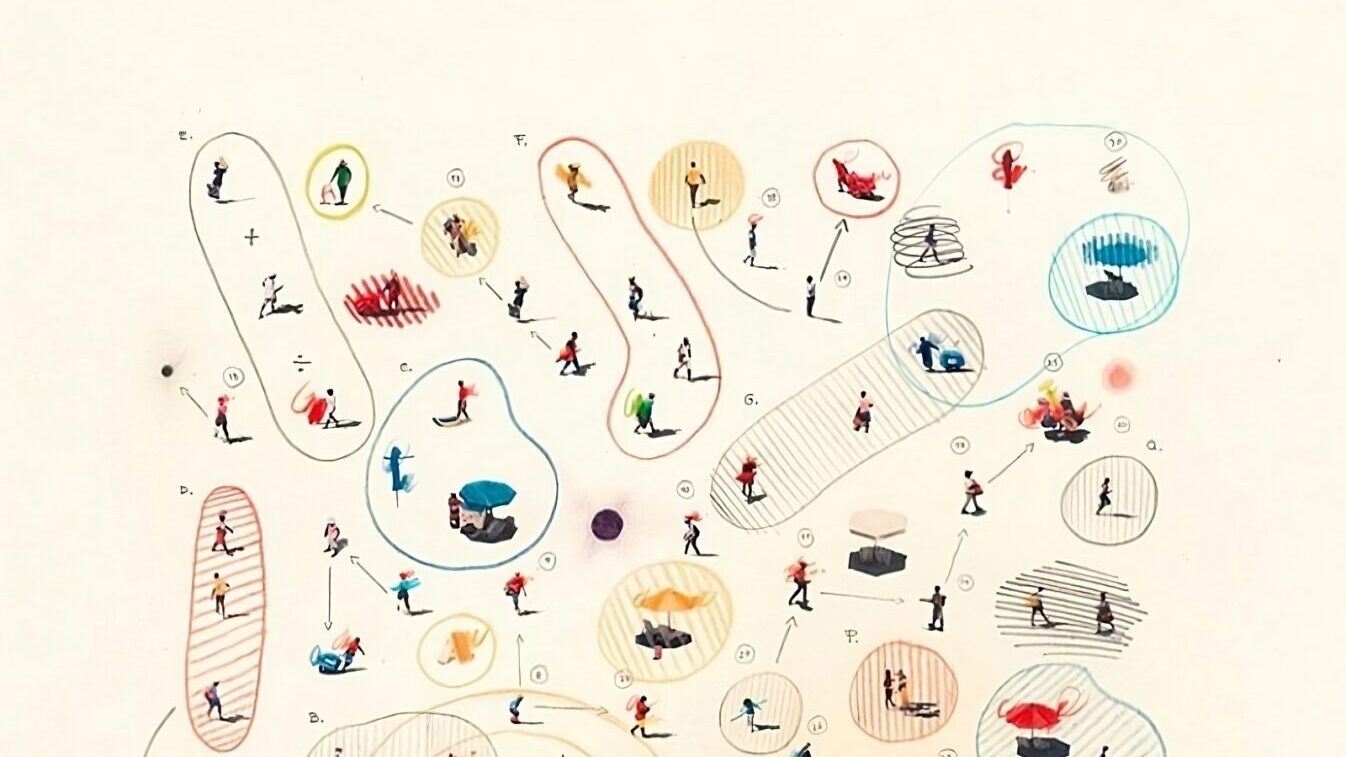Our project “How to Make Decisions” emerged as a reflection on the Museum of Care. In a rather large community, as is often the case, conflicts began immediately: Who makes decisions? What is consensus? What is direct democracy? And what can be brought to general discussion and what should remain private? Where is the line between a large collective and small groups of friends, circles, or private people?
To find answers to these questions, we started two projects: Fight Club and a series of dialogues: “How to Make Decisions.”
“What I especially want to stress here though is that, when value is about the production of people, it is always entirely implicated in processes of transformation: families are created, grow and break apart; people are born, mature, reproduce, grow old and die. They are constantly being socialized, trained, educated, mentored towards new roles – a process which is not limited to childhood but lasts until death; they are constantly being attended to and cared for.”
David Graeber
We are starting to work on a collection of interviews and texts about the decision-making process.
Here are announcements for the future and the past interviews.
Please comment, use, and suggest new ideas for future interviews and join us on zoom.
Campi Aperti is an association of small scale organic farmers fighting for food sovereignty; they started in 2001 at the initiative of 8 people (4 farmers, and 4 city dwellers). The first market stall was set up in XM24 a squats area of Bologna. The association has now about 600 members; they self-organize, and since three years ago they’ve been using the method of consensus in their decision making process.
Frank Engster – active since the 80s in the first autonomous movement, then autonomous Antifa and today in post-autonomous politics. He wrote his Ph.D. on Money and time, is interested in the critique of political economy and works in the field of political education.
NEXT INTERVIEWS:
Dyan Neary a professor of journalism at West Chester University who has taught creative writing in prisons for 7 years will be talking about decision-making process for the inmates.
Jo Freeman’s essay ‘The Tyranny of Structurelessness’ facilitated by Scott Thompson This is a reading group, not an interview, but I find it relevant to the project.
Saturday, February 20th, 13 GTM
Oleg Yasinsky (interview in Russian, subtitles in production) about the decision-making process in Zapatista’s communities. Oleg is a translator and writer living in Chily.
Past interviews:
27th of February
Frank Engster – active since the 80s in the first autonomous movement, then autonomous Antifa and today in post-autonomous politics. He wrote his Ph.D. on Money and time, is interested in the critique of political economy and works in the field of political education.
One of the most shocking interviews we did so far.
The Tories are rapidly destroying social infrastructure: moving money from prevention of crimes, social work and teens clubs to bureaucracy and PR.
It looks like they are setting up an infrastructure of violence and preparing the civil war with their own citizens.
The restructuring of the work of the homicide and rape cops was especially striking.
Dear God, give me another globe!
-
- Saturday, February 6th
Only once did we allow ourselves to bend the rules and do an interview with a person who initially stipulated that he may not be ready to publish it online. He didn’t tell any secrets 🙂
He was talking about small (5 to 20 people) emerging community, where issues of privacy may be very significant.
Interestingly, the conversation was about what community is, how it is formed. We talked about authority and lack of it about people who come and go for various reasons. So there won’t be a video here, but maybe a little later one of us will write a text that we’ll post here. I would call this text: alternative spaces in the process of self-reflection.
-
- Tuesday, February 2th,
Matthew Schultz described his master’s field research in Bolivia in 2010 one year after they approved the new constitutions that made the indigenous courts on equal legal standing as the state courts (derived from Spanish legal tradition).
- Tuesday, February 2th,
-
- Saturday, January 30th,
Dr Adrian Bowyer how to make decisions in open source projects. Notes on the interview:
- Saturday, January 30th,
The main points are:
1) Adrian Bowyer created the space in which most decisions: technological, ethical, and financial, have been made in small external teams located worldwide.
2) If decisions still had to be made by the core group,
@adrianbowyer
did it himself, as the project author, working within his own small group at Bath. An example of such a decision: whether or not to have a central site for the project.
The project’s technological and legal outline was set from the beginning: self-copying machines and an open-source license.
RepRap is, to my taste is one of the most important projects of our times. It totally changed the game.
I hope for #MuseumOfCare to follow the same path
Clare is one of the co-founder of the Extinction Rebellion and she talks to us about its structure and its decision-making process.
Gabriela Cabaña is an anthropology PhD student at LSE currently doing fieldwork in Chiloé, south of Chile. She’s currently doing research on energy transitions, bureaucracy and the state, trying to bring a feminist perspective to current social-environmental struggles. As a degrowth and basic income activist, Gabriela participated the Chilean Network of Basic Income and she is part of the Centro de Análisis Socioambiental (www.centrosocioambiental.cl) We asked her about collective decision making, specifically, during recent events in Chile: the national debate on the new constitution.
Rob Latchford


